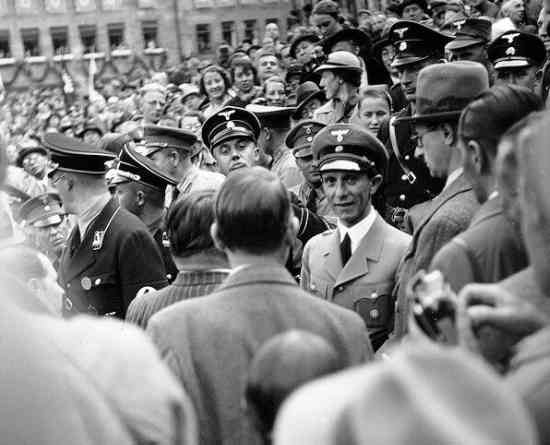
March 28
1915 World War I: First American citizen killed:
Leon Thrasher, a 31-year-old mining engineer and native of Massachusetts, drowned when a German submarine, the U-28, torpedoed the cargo-passenger ship Falaba, on its way from Liverpool to West Africa, off the coast of England. Of the 242 passengers and crew on board the Falaba, 104 drowned. Thrasher, who was employed on the Gold Coast in British West Africa, was returning to his post there from England as a passenger on the ship. 1916 World War I: Gefreiter Adolf Hitler endures trench warfare in Flanders (Artois) with 3 Company, 16 Reserve Infantry Regiment [List Regiment].
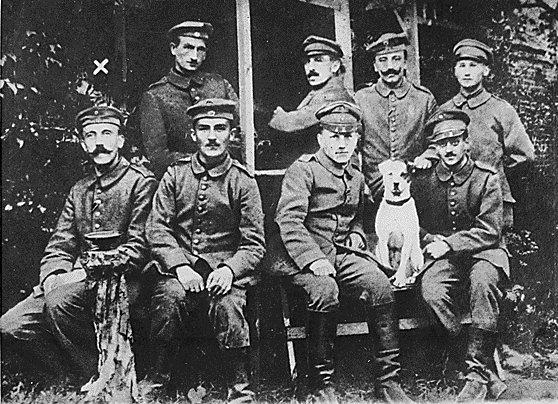
1917 World War I: Gefreiter Adolf Hitler's 16 Reserve Infantry Regiment [List Regiment] , 3 Company, fortify trenches near Arras. [For further details, Click here.]
1918 World War I: Various: General John Pershing's Offer to Subordinate US Forces to Ferdinand Foch:
I have come to tell you that the American people will hold it a high honour that their troops should take part in the present battle. I ask you to permit this in my name and in theirs. At the present moment there is only one thing to do, to fight. Infantry, artillery, aeroplanes—all that I have I put at your disposal—do what you like with them. More will come: in fact, all that may be necessary. I have come expressly to tell you that the American people will be proud to take part in this, the greatest and most striking battle of history.
1918 List Regiment: Gefreiter Adolf Hitler's 16 Reserve Infantry Regiment, 3 Company, joins the battle on the Somme: crossing the captured British line and occupying a position near Tergnier. [For further details, Click here.]
1930 Weimar: Dr. Heinrich Bruening forms a government that will support the Young Plan:

Heinrich Bruening, the leader of the Catholic Center party who became Chancellor when the Social Democrats and the establishment parties split in March 1930 under pressure from the Great Depression, was chosen Chancellor by the aging President of the Weimar Republic, the war hero Paul Hindenburg. Bruening sought to use this escape hatch to pass a policy of fiscal retrenchment and welfare state cutbacks. For as he promised Hindenburg, Bruening tried 'at any price [to] make the government finances safe' balancing the budget—reassuring investors that Germany was committed to financial orthodoxy—was Bruening's first and nearly his only priority. Thus Bruening spent the first months of his Chancellorship trying to balance the budget, only to find the economic situation outrunning him. The projected deficit tripled during his first three months. [For further details, Click here.]
1933 Various: Church and Reich:
Holocaust: A large protest rally is held in Tel Aviv against the persecution of German Jews by the Nazis. (THP)
1934 Various: Holocaust: From a letter of the Jewish firm Schwab to the Ministry of Economics, Berlin:
Neustadt am Aisch is full of signs such as 'The Jews are our misfortune' and 'Whoever buys from Jews is a traitor to the people.' The signs are even hung over streets. In addition, there have been about 60 popular meetings in recent weeks on the Jewish Question, where the speakers gave detailed accounts of cases of race defilement and the shameful acts of citizens who were still buying from Jews. In these meetings old customers that have started to buy from us again, are being named and libeled. In the last days the name of one of our customers from out of town who had bought a work outfit from us was publicly exposed in the Fraenkische Tageszeitung No. 72 and in the Stuermer pillory. The school children spit on customers entering our shop. One lady was pushed along the street with a rain of verbal abuse. The result? A complete cessation of business and total inability on our part to pay our bills.
[For further details, Click here.]Dr. Max Naumann—leader of a small group of ultra-nationalist, assimilationist Jews in Germany—organizes a Nazi-like party. Note: Max Naumann was chairman of the right-wing League of National German Jews, which called for eliminating Jewish identity. The League supported a Nazi-led national revolution, which was to realize the "rebirth of Germandom." His group was dissolved by the Gestapo; Naumann was imprisoned and later released. He died in 1939.
1935 Various: Holocaust: Wunderwaffen: Robert Goddard's A-5 successfully achieves supersonic velocity and an altitude of 1.46 km, using his new guidance system. [See: Wunderwaffen: Hitler's Deception and the History of Rocketry.] 1938 Various: Operation Green: Hitler gives General Wilhelm Keitel secret directives for action against Czechoslovakia: It is my unalterable decision to smash Czechoslovakia by military action in the near future. It is the business of the political leadership to await or bring about the suitable moment from a political and military point of view. An unavoidable development of events within Czecho-slovakia, or other political events in Europe providing a suddenly favorable opportunity which may never recur, may cause me to take early action. The proper choice and determined exploitation of a favorable moment is the surest guarantee of success. Holocaust: Berlin's Jewish community loses its incorporated status.
1939 Spanish Civil War ends:
The Republican defenders of Madrid raise the white flag over the city, bringing to an end the bloody three-year Spanish Civil War.
In 1931, Spanish King Alfonso XIII approved elections to decide the government of Spain, and voters overwhelmingly chose to abolish the monarchy in favor of a liberal republic. Alfonso subsequently went into exile, and the Second Republic, initially dominated by middle-class liberals and moderate socialists, was proclaimed. During the first five years of the Republic, organized labor and leftist radicals forced widespread liberal reforms, and the independence-minded Spanish regions of Catalonia and the Basque provinces achieved virtual autonomy.
The landed aristocracy, the church, and a large military clique increasingly employed violence in their opposition to the Second Republic, and in July 1936 General Francisco Franco led a right-wing army revolt in Morocco, which prompted the division of Spain into two key camps: the Nationalists and the Republicans. Franco's Nationalist forces rapidly overran much of the Republican-controlled areas in central and northern Spain, and Catalonia became a key Republican stronghold.
During 1937, Franco unified the Nationalist forces under the command of the Falange, Spain's fascist party, while the Republicans fell under the sway of the communists. Germany and Italy aided Franco with an abundance of planes, tanks, and arms, while the Soviet Union aided the Republican side. In addition, small numbers of communists and other radicals from France, the USSR, America, and elsewhere formed the International Brigades to aid the Republican cause. The most significant contribution of these foreign units was the successful defense of Madrid until the end of the war.
In June 1938, the Nationalists drove to the Mediterranean Sea and cut Republican territory in two. Later in the year, Franco mounted a major offensive against Catalonia. In January 1939, its capital, Barcelona, was captured, and soon after the rest of Catalonia fell. With the Republican cause all but lost, its leaders attempted to negotiate a peace, but Franco refused. On March 28, 1939, the victorious Nationalists entered Madrid in triumph, and the Spanish Civil War came to an end. Up to a million lives were lost in the conflict, the most devastating in Spanish history. (History.com)
1940 World War II: Various: Norway: Reich Foreign Minister Ribbentrop to German Ambassador in Moscow (Schulenburg): For the Ambassador personally. Secret. During my recent visit to Rome, where-as you know-I worked on the improvement of Italian-Russian relations among other things, I already contemplated carrying out the plan of a visit by Herr Molotov to Berlin. Although I did not mention this idea to anyone, the Anglo-French propaganda, correctly guessing my intentions, spoke of it with the hope of interfering with the plan and thereby with the further consolidation of our relations with Russia. I could have denied the Anglo-French report without any trouble, but refrained from doing so out of consideration for Molotov. Then, the Russian press for its part issued a denial. Nevertheless, I have not given up the idea of a visit by Molotov to Berlin. On the contrary, I should like to retain it, and if it can be realized I should like to put it into effect in the near future. It goes without saying that the invitation is not to be confined to Herr Molotov; it would suit our own needs better, as well as our really ever-closer relations with Russia, if Herr Stalin himself came to Berlin. The Fuehrer would not only be particularly happy to welcome Stalin in Berlin, but he would also see to it that he would get a reception commensurate with his position and importance, and he would extend to him all the honors that the occasion demanded. An invitation both to Herr Molotov and to Herr Stalin has, as you know, already been issued orally by me in Moscow and was accepted by both of them in principle. In what manner the invitation should now be repeated, and its definite acceptance and realization attained, you yourself can judge best. During the conversation to be conducted you will have to word the invitation to Herr Molotov more definitely, whereas you will have to state the invitation to Herr Stalin in the name of the Fuehrer in less definite terms. We must, of course, avoid receiving a clear-cut refusal from Stalin. Before you take any action, I request that you comment on the subject immediately, reporting to me by wire your opinion as to the procedure to be followed by you and the prospects for its success. 1941 Various: Cunningham leads fateful British strike at Italians:
On this day, Andrew Browne Cunningham, Admiral of the British Fleet, commands the British Royal Navy's destruction of three major Italian cruisers and two destroyers in the Battle of Cape Matapan in the Mediterranean. The destruction, following on the attack on the Italian Fleet at Taranto by the British in November 1940, effectively put an end to any threat the Italian navy posed to the British. 'Euthanasia': Brack, who has been placed in charge of the program, writes from the Reich Chancellery to the Reichsfuehrer-SS, Himmler, that the problem of sterilizing large numbers of individuals by means of X-rays has been solved in principle. (THP)
Death: Virginia Woolf: at 59, author, distinguished feminist essayist, critic, and a central figure of the Bloomsbury group, by suicide. She leaves a note for her husband, Leonard, and for her sister, Vanessa: 'I feel certain that I'm going mad again. I feel we can't go thru another of those terrible times. And I shan't recover this time. I begin to hear voices.' The brilliant writer had suffered several nervous breakdowns throughout her life, and after the Germans invaded Paris during World War II, Woolf and her husband, who was Jewish and a socialist, discussed killing themselves with different methods. It was after her London home, with all of their belongings, was bombed, that she fell into a great depression, and on this date, took her walking stick and down to the Ouse River. She forced a large stone into her coat pocket and entered the water.
Land cleared for Ford's Willow Run plant:
On this day in 1941, workers start clearing trees from hundreds of acres of land near Ypsilanti, Michigan, some 30 miles west of Detroit, in preparation for the construction of the Ford Motor Company's Willow Run plant, which will use Henry Ford's mass-production technology to build B-24 bomber planes for World War II. During the war, Detroit was dubbed the "Arsenal of Democracy," as American automakers reconfigured their factories to produce a variety of military vehicles and ammunition for the Allies.
When it opened in 1941, expectations were high for Willow Run, which at some 3.5 million square feet was called the world's largest factory under a single roof. Early on, however, the plant was plagued by such issues as labor shortages and earned the nickname "Willit Run?" The initial problems were later ironed out, as workers were recruited from the South, women were hired and employee housing was constructed. Willow Run eventually employed over 42,000 people and by 1944, the plant was producing one plane every hour. By the end of the war in 1945, more than 8,600 B-24s had been built at Willow Run and the plant's mass-production techniques were hailed as a symbol of American ingenuity. [For further details, Click here.]
1942 World War II: Various: St. Nazaire: Holocaust: From Ha-Shomer Ha-Za'ir newspaper in the Warsaw Underground Jutrznia (Dawn), a Call to Armed Self-Defense: We know that Hitler's system of murder, slaughter, and robbery leads steadily to a dead end and the destruction of the Jews. The fate of the Jews in the Soviet Russian areas occupied by the Germans, and in the Warthegau, marks a new period in the total annihilation of the Jewish population. The huge murder machine has been turned against Jewish masses that are weak, unarmed, brought low by hunger, camps, and deportations. With satanic methods it liquidates the Jewish population centers one by one. The victory over the Jews will have to serve the Germans as recompense for the losses they have suffered at the front. Spilling the blood of defenseless Jews will have to take the place of Hitler's great dreams that failed to come true. We also know that the march of Hitler's troops has been halted by the heroic Red Army and that the Spring Offensive will see the beginning of the far-reaching destruction of the Nazis in Europe. For the Jewish masses this will be a period of greater bloodshed than any in their history. There is no doubt that when Hitler feels that the end of his rule is approaching, he will seek to drown the Jews in a sea of blood. Jewish youth must prepare in the face of those difficult days. There must therefore be a start to the recruiting of all creative forces among the Jews. Despite the destruction many such forces still remain. For generation upon generation passivity and lack of faith in our own strength had pressed upon us; but our history also shows beautiful pages glowing with heroism and struggle. It is our duty to join this period of heroism.
1943 Holocaust: Professor Fischer begins an article in the Deutsche Allgemeine Zeitung with the sentence: "It is a rare and special good fortune for a theoretical science to flourish at a time when the prevailing ideology welcomes it, and its findings can immediately serve the policy of the state." (THP)
1945 World War II: Various: Poland: Albert Speer—after being informed that Goebbels is planning to draft the members of the Berlin Philharmonic into the Volkssturm—takes steps to protect the musicians from fruitless combat and death. Hitler, when he wanted to protect someone from conscription, would utilize the simple strategy of pulling their files from the draft board. Speer pulls this same trick, while loading up the Orchestra's library of scores and many instruments and sending them off to a secret location for safekeeping. He also makes plans with the conductor to spirit away the musicians at the proper moment in order to keep them from Goebbels' clutches. Speer, second only to Goebbels himself as the major patron of the orchestra, colludes with the manager to have Wagner's Goetterdaemmerung placed on the evening playlist after he sends word that the time is right for evacuation. (Read) 
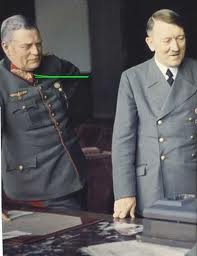


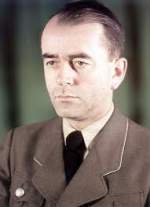

To avoid interruption from air attack, it had been customary for some time for these afternoon 'briefings,' as they were called, to be held in the corridor of Hitler's personal underground bunker, and into this confined space there crowded, at 2 PM on 28th March, Guderian and Busse, Keitel, Jodl, Burgdorf, Hitler, Bormann, and sundry adjutants, staff officers, stenographers, and men of the SS bodyguard. Soon the conference took on the character, which was to be a recurrent feature of the 'bunker period,' of a hysterical multipartite shouting match. Busse had barely started on his report when Hitler began to interrupt him with the same accusations of negligence, if not cowardice, which Guderian had protested against the previous day.
Guderian then began to interrupt, using unusually strong and dissenting language, drawing in turn murmurs of reproof from Keitel and Burgdorf. Finally Hitler brought the company to order by dismissing everyone except Guderian and Keitel, and turning to Guderian he said, 'Colonel-General, your physical health requires that you immediately take six weeks' convalescent leave.' With the dismissal of Guderian the last rational and independent influence was removed from the direction of military affairs in Germany. Only the 'Nazi soldiers' remained, all of them now in timid conformity with Brauchitsch's 'office boy' image and tied to the execution of the Fuehrer's wayward policies. It was one more paradox of the Russian campaign that at the end, when Hitler had mastered the General Staff and finally extinguished the evasions and insubordinations which had persisted among them (albeit in diminishing strength) since 1941, he began to take on all the characteristics which the generals had so long ascribed to him, and which they had used to excuse their own intermittent disobedience.
Goebbels Diary:
But it pains me that he (Hitler) is at present not moved to do anything so that the political crisis in the enemy camp deepens. He doesn't change personnel, either in the Reich government or in the diplomatic service. Goering stays, Ribbentrop stays. All failures - apart from the second rank - are retained, and it would in my view be so necessary to undertake here in particular a change of personnel because this would be of such decisive importance for the morale of our people. I press and press; but I can't convince the Fuehrer of the necessity of these measures that I put forward. (Kershaw)
[See: Why Didn't Adolf Hitler Fire Hermann Goering?]
War in the Air: Churchill, in spite of opposition by 'Bomber' Harris and others, orders restrictions on area bombings of German population centers, telling the war cabinet: "Otherwise, we shall come into control of an utterly ruined land . . . . The destruction of Dresden remains a serious query against the conduct of Allied bombing." (Jenkins)
1946 Nuremberg Tribunal: On day 93, Ribbentrop's Defence calls Fraulein Margarete Blank, Ribbentrop's secretary:
Blank: Herr Von Ribbentrop always showed the greatest admiration and veneration for Adolf Hitler. To enjoy the Fuehrer's confidence, to justify it by his conduct and work was his chief aim, to which he devoted all his efforts. To achieve this aim no sacrifice was too great. In carrying out the tasks set him by the Fuehrer he showed utter disregard for his own person. When speaking of Hitler to his subordinates he did so with the greatest admiration. Appreciation of his services by the Fuehrer, as for instance the award of the Golden Party Badge of Honor, the recognition of his accomplishments in a Reichstag speech, a letter on the occasion of his fiftieth birthday, full of appreciation and praise, meant to him the highest recompense for his unlimited devotion.
[For the rest of Margarete Blank's testimony, Click here.]On day 93, Ribbentrop's Defence also calls Reich Foreign Office interpreter Dr. Paul Otto Schmidt:
Schmidt: When Henderson requested that the document containing the German proposals be submitted to him, the Foreign Minister said: "No, I cannot give you the document." These are the words he used. This of course was a somewhat unusual procedure because normally Sir Neville Henderson had the right to expect that a document which had just been read out would be handed to him. I myself was rather surprised at the Foreign Minister's answer and looked up because I thought I had misunderstood. I looked at the Foreign Minister and heard him say for the second time: "I cannot give you the document." But I saw that this matter caused him some discomfort and that he must have been aware of the rather difficult position in which he found himself by this answer, because an uneasy smile played on his lips when he said in a quiet voice to Sir Neville Henderson these words, "I cannot give you the document." Then I looked at Sir Neville Henderson as I of course expected him to ask me to translate the document, but this request was not forthcoming. I looked at Henderson rather invitingly, since I wanted to translate the document, knowing how extraordinarily important a quick and complete transmission of its contents to the British Government was. If I had been asked to translate I would have done so quite slowly, almost at dictation speed, in order to enable the British Ambassador in this roundabout way to take down not merely the general outline of the German proposal but all its details and transmit them to his Government. But Sir Neville Henderson did not react even to my glance so that the discussion soon came to an end and events took their course.
[For all of Paul Otto Schmidt's testimony, Click here.]On day 93, Ribbentrop finally testifies on his own behalf:

Ribbentrop: I had the impression that I was facing a man who knew what he wanted and who had an unshakable will and who was a very strong personality. I can summarize by saying that I left that meeting with Hitler convinced that this man, if anyone, could save Germany.
[For the rest of Ribbentrop's testimony, Click here.]Nuremberg Tribunal: The Daily Telegraph describes Ribbentrop's court appearance: "His face was drawn, his cheeks were sunken and pallid...His gait was halting as he walked to the witness stand clutching a file of papers . . . . (Ribbentrop's testimony was) a nebulous apologia which only narrowly escaped the stigma of cowardice."
[See: Are There Any Lasting Effects From the Nuremberg Trials?]1946 Cold War: Acheson-Lilienthal Report released:
The State Department releases the so-called Acheson-Lilienthal Report, which outlines a plan for international control of atomic energy. The report represented an attempt by the United States to maintain its superiority in the field of atomic weapons while also trying to avoid a costly and dangerous arms race with the Soviet Union
In June 1946, Truman selected businessman Bernard Baruch to present the plan at the United Nations. Baruch, however, changed many of the key points of the plan and insisted that the United States would have an ultimate veto power on any issues arising in connection with the plan. The Soviets quickly rejected the idea so the vote was never held in the United Nations. The United States and the Soviet Union would go their own ways in developing their nuclear arsenals. In 1949, the Soviets exploded an atomic device and the nuclear arms race was on.
[For further details, Click here]1969 Death: Dwight D. Eisenhower: 34th president of the United States and one of the most highly regarded American generals of World War II, dies in Washington, D.C., at the age of 78.
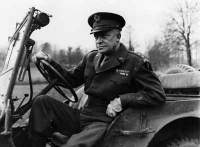
Born in Denison, Texas, in 1890, Eisenhower graduated from the United States Military Academy in 1915, and after World War I he steadily rose in the peacetime ranks of the U.S. Army. After the U.S. entrance into World War II, he was appointed commanding general of the European theater of operations and oversaw U.S. troops massing in Great Britain. In 1942, Eisenhower, who had never commanded troops in the field, was put in charge of Operation Torch, the Anglo-American landings in Morocco and Algeria.
As supreme commander of a mixed force of Allied nationalities, services, and equipment, Eisenhower designed a system of unified command and rapidly won the respect of his British and Canadian subordinates. From North Africa, he successfully directed the invasions of Tunisia, Sicily, and Italy, and in January 1944 was appointed supreme Allied commander of Operation Overlord, the Allied invasion of northwestern Europe. Although Eisenhower left much of the specific planning for the actual Allied landing in the hands of his capable staff, such as British Field Marshall Montgomery, he served as a brilliant organizer and administrator both before and after the successful invasion.
After the war, he briefly served as president of Columbia University before returning to military service in 1951 as supreme commander of the combined land and air forces of the North Atlantic Treaty Organization (NATO). Pressure on Eisenhower to run for U.S. president was great, however, and in the spring of 1952 he relinquished his NATO command to run for president on the Republican ticket.
In November 1952, "Ike" won a resounding victory in the presidential elections and in 1956 was reelected in a landslide. A popular president, he oversaw a period of great economic growth in the United States and deftly navigated the country through increasing Cold War tension on the world stage. In 1961, he retired with his wife, Mamie Doud Eisenhower, to his farm in Gettysburg, Pennsylvania. He died in 1969 and was buried on a family plot in Abilene, Kansas. (History.com)
1978 Sterilization: USA: US Supreme Court hands down 5-3 decision in Stump v. Sparkman, 435 U.S. 349, a controversial case involving involuntary sterilization and judicial immunity.
[See: Can We, and Should We, Try to Explain the Holocaust?]1979 USA: Reactor overheats at Three Mile Island:
The most serious nuclear accident in United States history takes place at the Three Mile Island plant near Harrisburg, Pennsylvania, on this day in 1979, when one of the reactors overheats. Fortunately, a catastrophic meltdown was averted and there were no deaths or direct injuries from the accident. [For further information, click here]

1990 Olympics: President George H. W. Bush posthumously awards Jesse Owens the Congressional Gold Medal.
[See: History of Olympic Boycotts: From Berlin to Beijing.]Edited by Levi Bookin (Copy editor) Click to join 3rdReichStudies FAIR USE NOTICE: This site may contain copyrighted material the use of which has not always been specifically authorized by the copyright owner. We are making such material available in our efforts to advance understanding of historical, political, human rights, economic, democracy, scientific, environmental, and social justice issues, etc. We believe this constitutes a 'fair use' of any such copyrighted material as provided for in section 107 of the US Copyright Law. In accordance with Title 17 U.S.C. Section 107, the material on this site is distributed without profit to those who have expressed a prior interest in receiving the included information for research and educational purposes. If you wish to use copyrighted material from this site for purposes of your own that go beyond 'fair use', you must obtain permission from the copyright owner. Please note that the list-owner and the moderator are not responsible for, and do not necessarily approve of, the random ads placed on our pages by our web server. They are, unfortunately, the price one pays for a 'free' website.
levi.bookin@gmail.com







